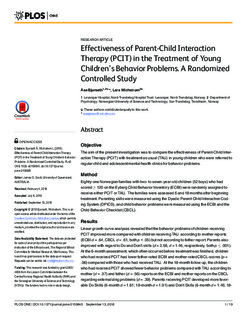| dc.contributor.author | Bjørseth, Åse Gresseth | |
| dc.contributor.author | Wichstrøm, Lars | |
| dc.date.accessioned | 2017-12-28T14:20:11Z | |
| dc.date.available | 2017-12-28T14:20:11Z | |
| dc.date.created | 2017-01-02T13:48:51Z | |
| dc.date.issued | 2016 | |
| dc.identifier.citation | PLoS ONE. 2016, 11 (9). | nb_NO |
| dc.identifier.issn | 1932-6203 | |
| dc.identifier.uri | http://hdl.handle.net/11250/2473833 | |
| dc.description.abstract | Objective
The aim of the present investigation was to compare the effectiveness of Parent-Child Interaction Therapy (PCIT) with treatment as usual (TAU) in young children who were referred to regular child and adolescent mental health clinics for behavior problems.
Method
Eighty-one Norwegian families with two- to seven-year-old children (52 boys) who had scored ≥ 120 on the Eyberg Child Behavior Inventory (ECBI) were randomly assigned to receive either PCIT or TAU. The families were assessed 6 and 18 months after beginning treatment. Parenting skills were measured using the Dyadic Parent-Child Interaction Coding System (DPICS), and child behavior problems were measured using the ECBI and the Child Behavior Checklist (CBCL).
Results
Linear growth curve analyses revealed that the behavior problems of children receiving PCIT improved more compared with children receiving TAU according to mother reports (ECBI d = .64, CBCL d = .61, both p < .05) but not according to father report. Parents also improved with regard to Do and Don’t skills (d = 2.58, d = 1.46, respectively, both p ≤ .001). At the 6-month assessment, which often occurred before treatment was finished, children who had received PCIT had lower father-rated ECBI and mother-rated CBCL-scores (p = .06) compared with those who had received TAU. At the 18-month follow-up, the children who had received PCIT showed fewer behavior problems compared with TAU according to mother (d = .37) and father (d = .56) reports on the ECBI and mother reports on the CBCL regarding externalizing problems (d = .39). Parents receiving PCIT developed more favorable Do Skills (6-month d = 1.81; 18-month d = 1.91) and Don’t Skills (6-month d = 1.46; 18-month d = 1.42) according to observer ratings on the DPICS compared with those receiving TAU.
Conclusion
Children receiving PCIT in regular clinical practice exhibited a greater reduction in behavior problems compared with children receiving TAU, and their parents' parenting skills improved to a greater degree compared with those receiving TAU.
Trial Registration
ClinicalTrials.gov NTC01085305 | nb_NO |
| dc.language.iso | eng | nb_NO |
| dc.publisher | Public Library of Science | nb_NO |
| dc.rights | Navngivelse 4.0 Internasjonal | * |
| dc.rights.uri | http://creativecommons.org/licenses/by/4.0/deed.no | * |
| dc.title | Effectiveness of Parent-Child Interaction Therapy (PCIT) in the Treatment of Young Children's Behavior Problems. A Randomized Controlled Study | nb_NO |
| dc.type | Journal article | nb_NO |
| dc.type | Peer reviewed | nb_NO |
| dc.description.version | publishedVersion | nb_NO |
| dc.source.pagenumber | 19 | nb_NO |
| dc.source.volume | 11 | nb_NO |
| dc.source.journal | PLoS ONE | nb_NO |
| dc.source.issue | 9 | nb_NO |
| dc.identifier.doi | 10.1371/journal.pone.0159845 | |
| dc.identifier.cristin | 1419253 | |
| dc.description.localcode | © 2016 Bjørseth, Wichstrøm. This is an open access article distributed under the terms of the Creative Commons Attribution License, which permits unrestricted use, distribution, and reproduction in any medium, provided the original author and source are credited. | nb_NO |
| cristin.unitcode | 194,67,40,0 | |
| cristin.unitname | Institutt for psykologi | |
| cristin.ispublished | true | |
| cristin.fulltext | original | |
| cristin.qualitycode | 1 | |

